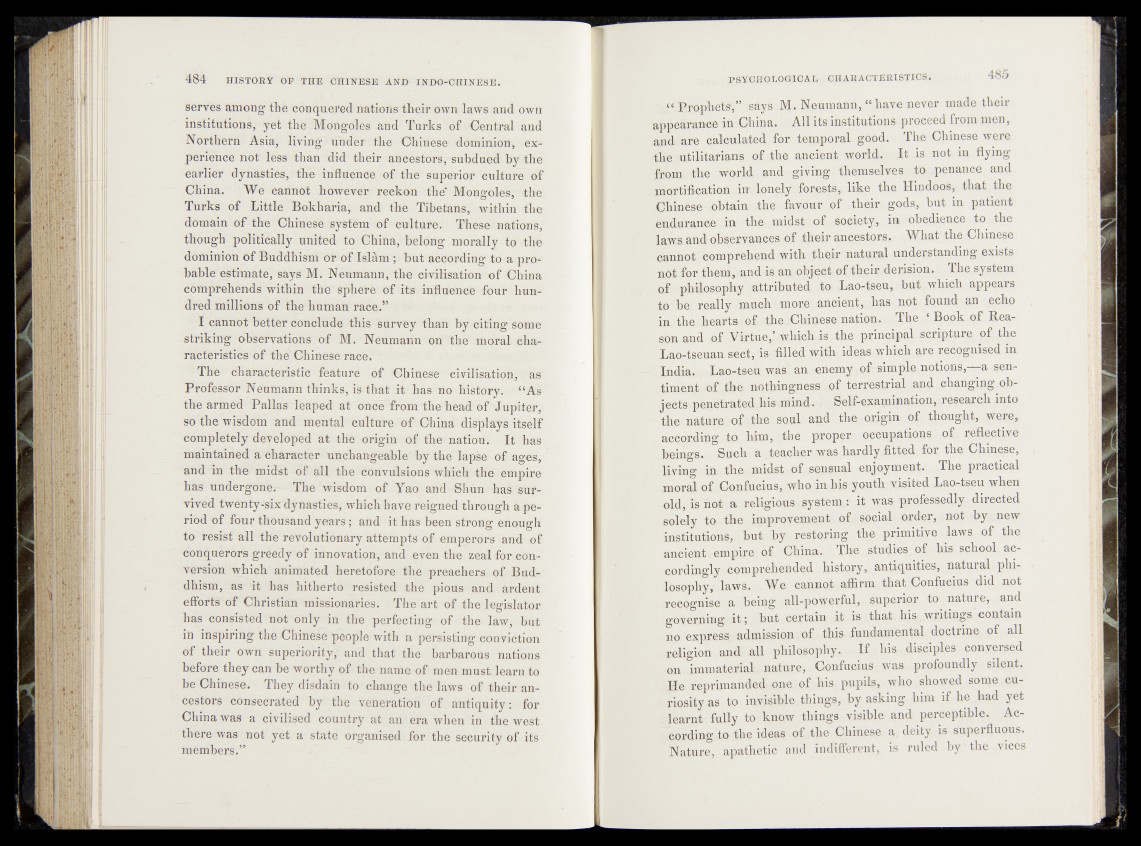
serves among thé conquered nations theif’öwn laws and own
institutions,-ÿet the .Mongoles and Turks OfbfCentral and
Northern Asm[* living1 under the Chinese dominion, experience
not less than did their ancestors, subdued by the
earlier dynasties, the influence of the’ superior culture of
China. We cannot however reckon the* Mongoles, the
Turks of Little Bokharia, and the Tibetans, within the
domain of the Chinese, system of culture. These nations,
though politically united to China, belong morally to the
dominion Of Buddhism or of Islàm ; but according to a probable
estimate, says M. Neumann, the civilisation of China
comprehends within the'" sphere of its influence four hundred
millions of the human race.”
I cannot better conclude this survey than bÿ 'citin^some
-striking observations of M. Neumann on the moral characteristics
of the Chinese race.
The characteristic feature of Chinese^cmiiSatidn; as
Professor’Neumann thinks, is that it htöfno-'&st©rj* <,“‘Âs
the armed Pallas leaped at onhe'firom the head of Jupiter,
so the wisdom and mental culture of China displays-'Mèelf
completely developed at the origin of the nation. It has
maintained a character unchangeable" by the lapse ofkagfes,
and in the-midst df all the convulsions which the empire
bus undergmHh- The wisdom of Tan afld-Shûn h â s -survived
twénty-sixdynâsties, which havëjrëigned tkrbngh-a period
of four thousand years ; and it has been strong enough
to resist all the revolutionary attempts of emperors andviof
conquerors greedy of innovation, and even the zeal femtebn-
version which animated heretofore the preachers: of Buddhism,
as it has hitherto resisted thé pious and ardent
effort's Of Christian missionaries. The art of tbelegislator
has consisted not only in the perfecting of the law, hut
in inspiring the Chinese people with a persisting conviction
Of their own superiority* and that thé barbarous nations
before they can be worthy of the name of men must learn to
be Chinese. They disdain to change the laws of their ancestors
consecrated "by the veneration of antiquity : for
China was a civilised country at .an era when in the west
there"was not yet a state organised for the security of its
members.”
■ « Prophets*,” says M. Neumann, “ have never made their
appearance in China. All its institutions proceed from men,
and are calculated.,f@,r; temporal good. The Chinese were
the utilitarians of the ancient world. It is not in flying
from, the world and. giving themselves to penance and
mortification in lonely iforests, like the Hindoos, that the
Chinese- -obtain the favour .©f their gods, but in patient
endurance in, the midsj^of society, in obedience to the
laws and observances,of their ancestors. What the Chinese
cannot comprehend with« their natural understanding exists
not for them,;and is atoiobjact*pf their derision. The system
of philosophy attributed to- Laodseu, but which appears
to «he’'really much'tmope ancient, h.as not found an echo
in the$ hearts?.of the Chinese nation. T l ^ e Book of. Reason
and of Virtue,’,which is,the principal scripture, of the
Lao-tseuan sect,' is .filled with ideas which are recognised in
India. .;L^p-tseuwas' an enemy;of*simple,notions,—a sentiment
of dhe,nothingness,, of ■ terrestrial and changingwob-
jects penetrated Jiis'fcmind • Sel:f examination,^research, into
the nature’ pf$. the soul and the origin.,,of thought, were,
^according,to .him, the proper, .occupations of reflective
icings. iSpch a .teacher, was hardly^tted. fer the Chinese*
living dn thetl midst ©f sensual enjoyment.. The practical
moral of Confucius, who in his-youth* visited Lao-tseu when
old, is not a religious .system.: it was professedly directed
r Solely to the improvemen%*qf ~ social order, -.not by . new
institutions, but by restoring the primitive laws of the
ancient empire of - China., The studies ;.qf,. his school accordingly
comprehended thist^yy,;',antiquities, natural philosophy,
laws. We cannot „alfirm. that Confucius did not
recognise a being all-powerful, superior. ,tp nature, and
governing it; certain it is that,his,waitings,*contain
no express; admission vof this fundamental doctrine, of all
religion .and all philosophy. If Ifis^disciples conversed
on immaterial .nature, .C.onfu.cius was profoundly silent.
He reprimanded one of his, pupilg, who,showed some curiosity
as tm invisible things, by asking him if he had yet
. learnt fully to*know things visihle1(and perceptible. According
to the ideas of ^he, Chinese a deity.is superfluous.
Nature, apathetic and indifferent, is ruled by the vices